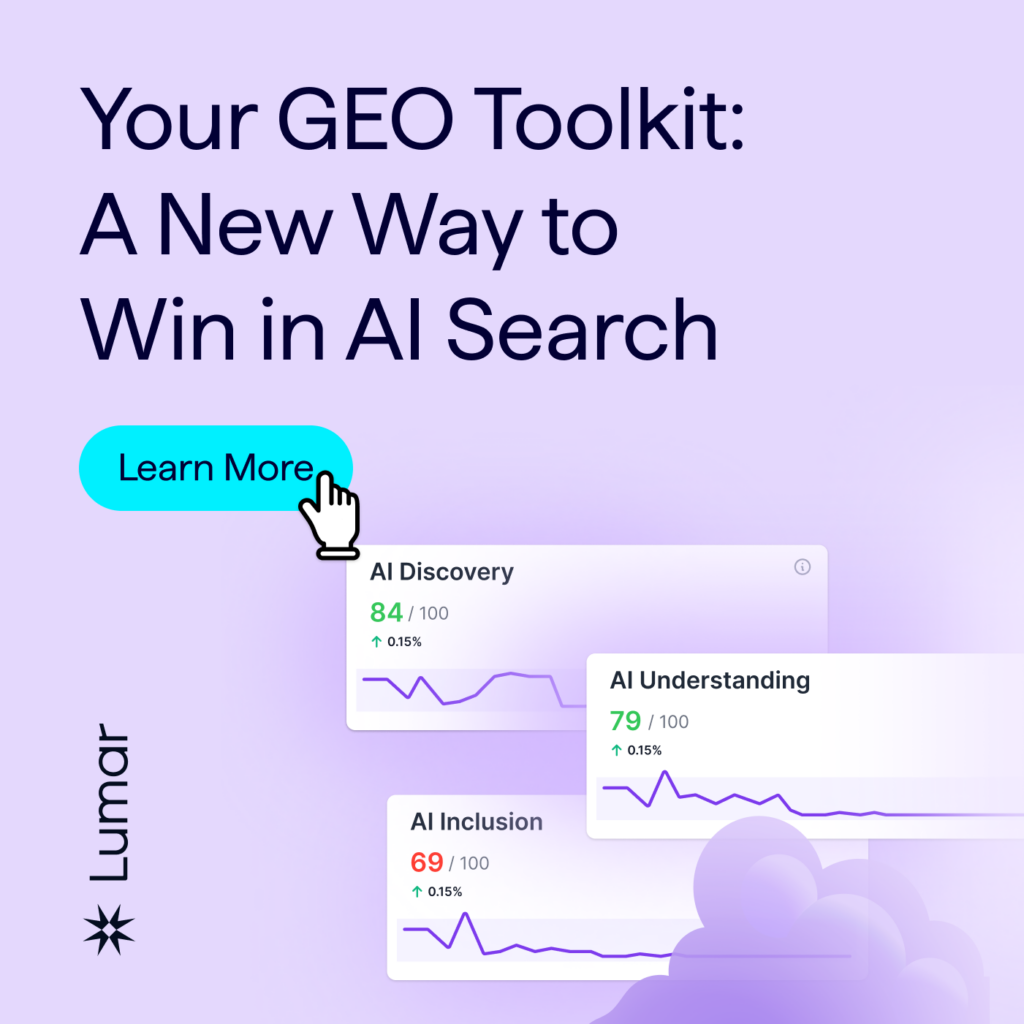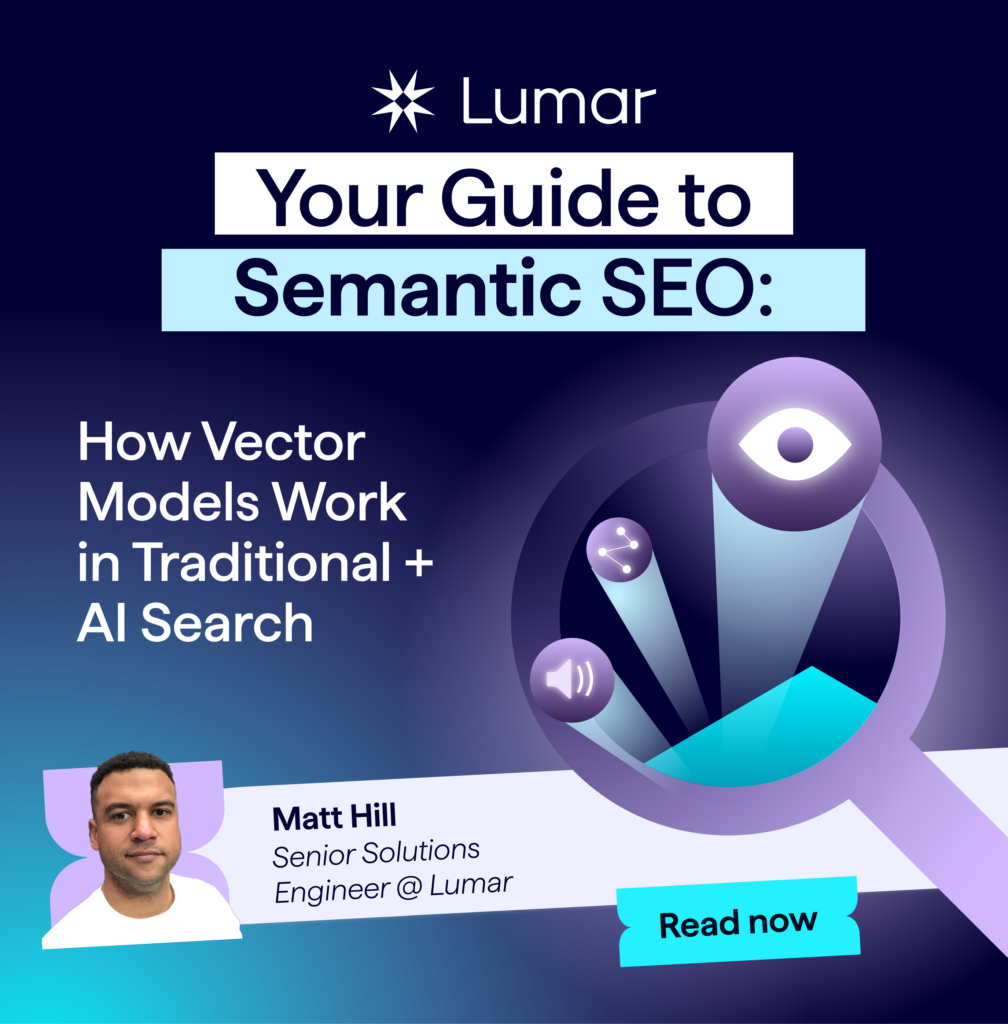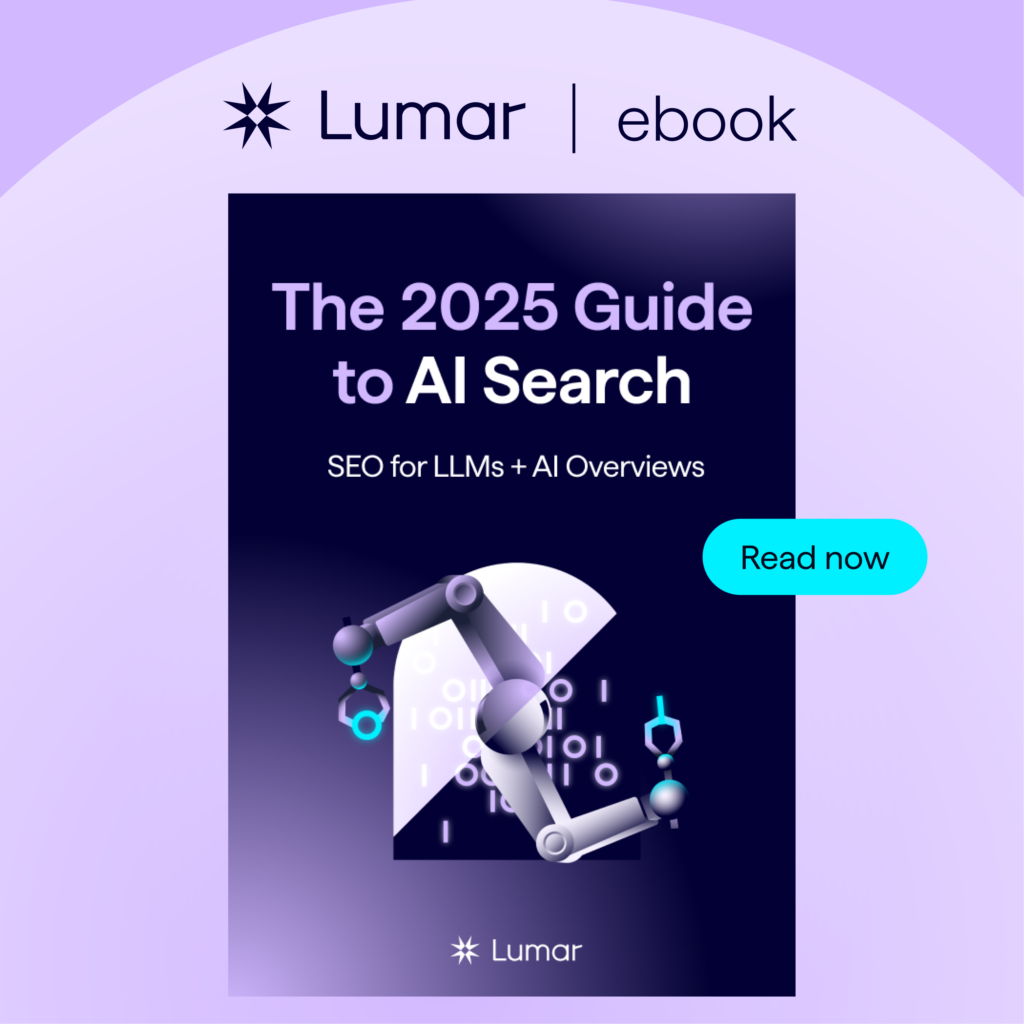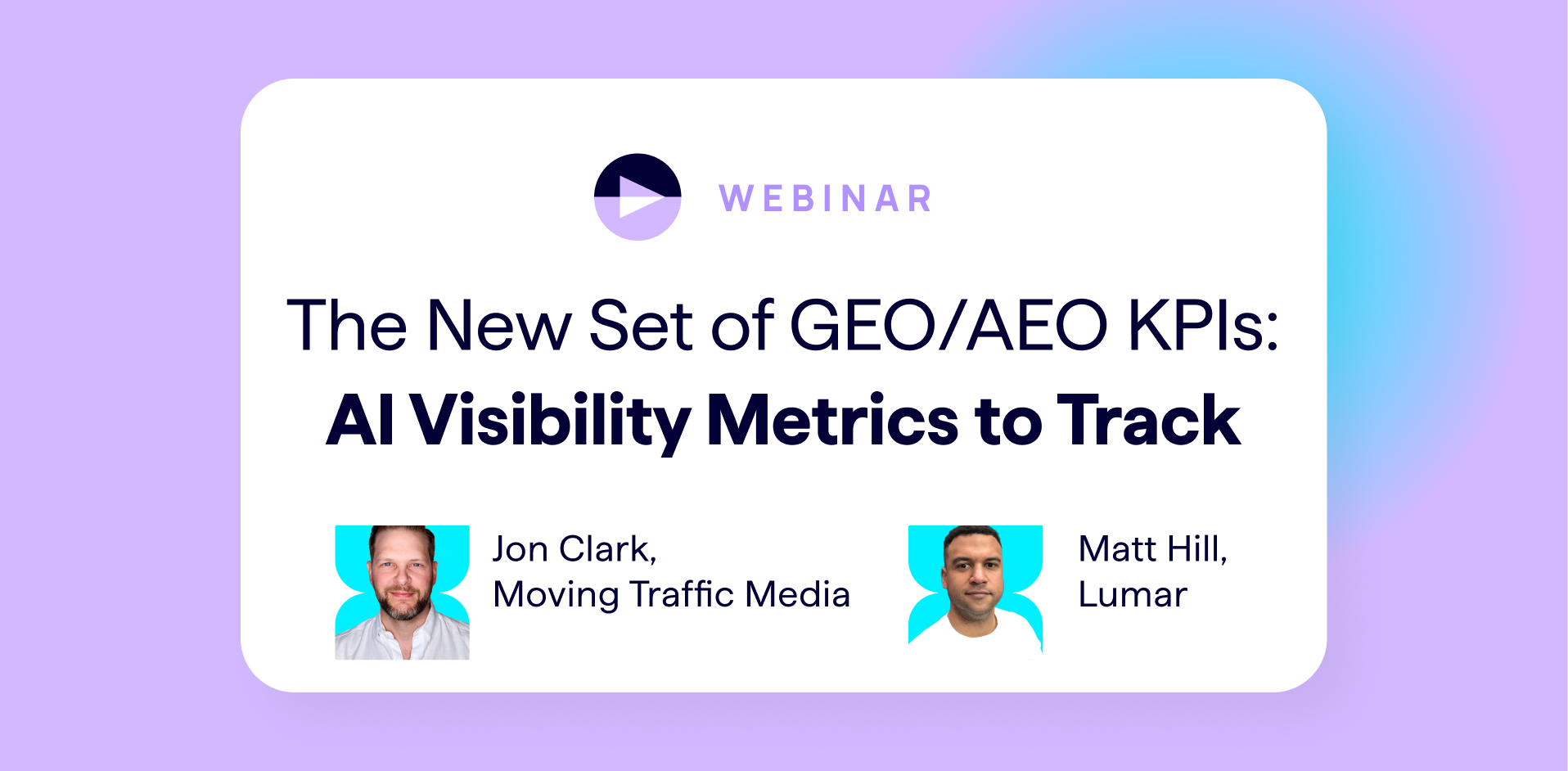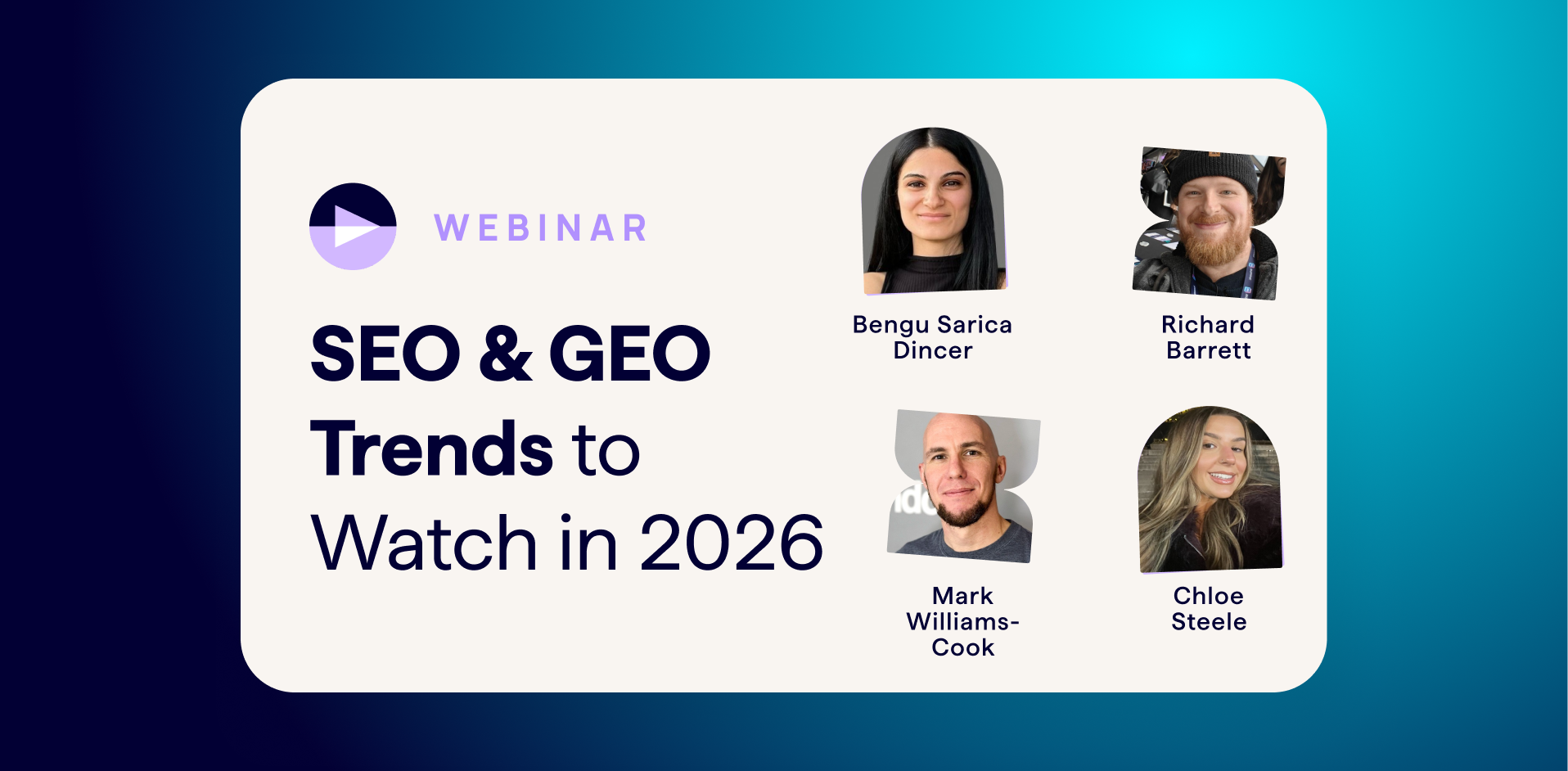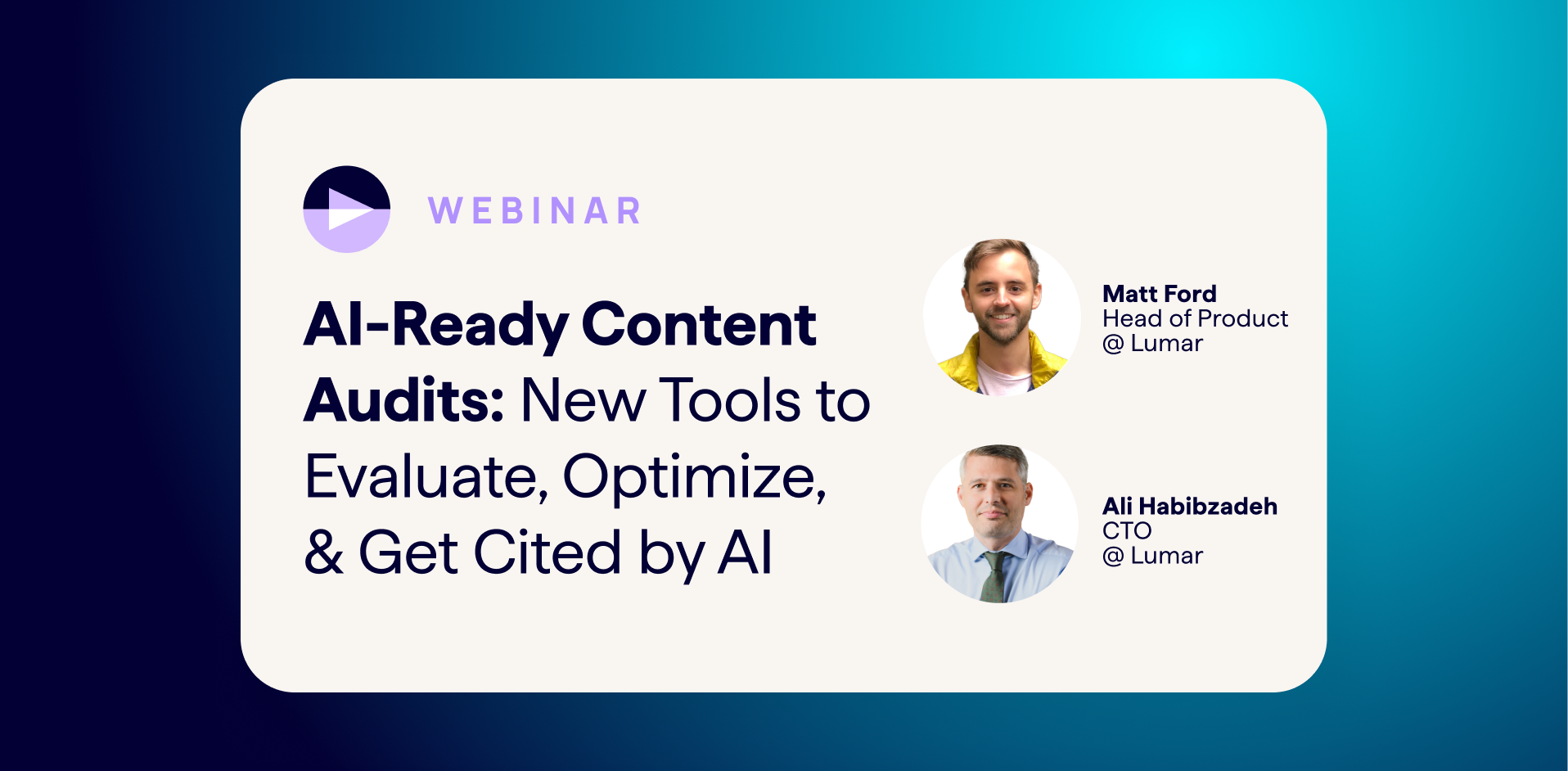Generative Engine Optimization (GEO): Boost AI search visibility with new tools in Lumar
SEOs are increasingly incorporating GEO, or Generative Engine Optimization, into their strategies to enhance AI search visibility. But what tools, platforms, and reports can really help move the needle when it comes to optimizing for AI search?
In this special solutions-focused webinar, we’re exploring the latest Lumar features for GEO.
Joining our Head of Product Marketing, Andrew Levey, for this deep dive into Lumar tools that can help you win in AI search, we have:
Watch the full webinar above – including audience poll results and Q&A session — or read on for our top takeaways.
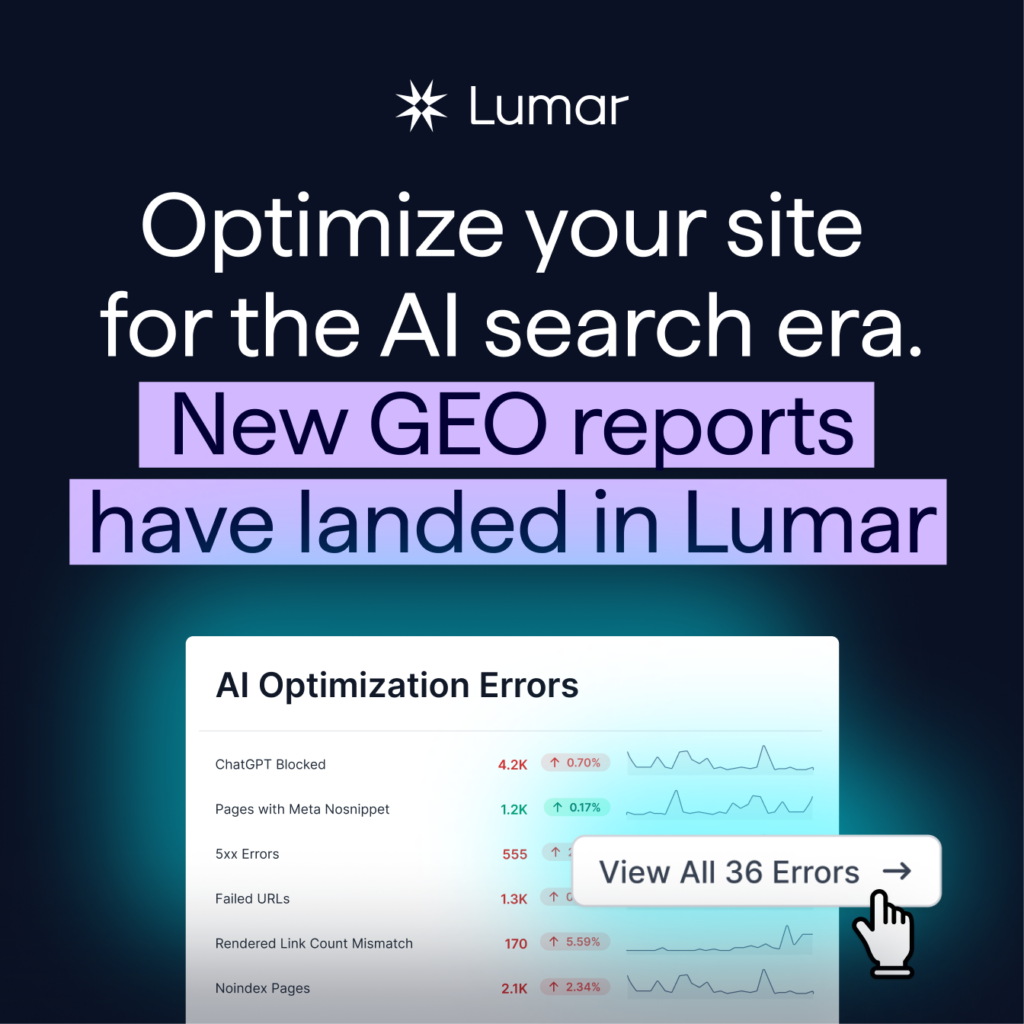
TLDR? Get started with a Lumar GEO platform demo & see the tools in action yourself
Read on for the details about Lumar’s new GEO toolkit — or see the platform in action firsthand with your personalized Lumar GEO demo — simply fill out the form here to get started.
Discover why Lumar is the website optimization platform of choice for leading enterprise brands:

Lumar GEO Toolkit Webinar Recap:
Market shifts: the new reality of AI search
“There’s a tremendous amount of noise right now when it comes to AI search and GEO (generative engine optimization), as I think everyone recognizes,” says Lumar CEO Panous Savopoulos. “Some of it's good, some of it's bad, some we frankly just don't know what the impact is. And I know there's a lot of pressure from management across a lot of organizations that are really pushing teams to come up with a plan [for AI search visibility].”
Savopoulos points to 3 broad categories of challenges and opportunities in AI search today:
AI Search Challenge #1: Organizational Visibility:
Unlike traditional search analytics, AI search doesn't provide the same transparent traffic data.
“But furthermore, it’s hard to link AI-generated citations directly to business outcomes,” says Savopoulos.
“Generative search often only shows a few sources, creating what I define as a ‘winner takes most’ visibility gap. And AI summaries may inaccurately paraphrase or omit key messages, right? That represents a fairly significant challenge.”
AI Search Challenge #2: Trust in Data
The lack of clarity around why some sources are chosen over others in AI results is a major concern for SEOs and digital marketers.
“We know AI can misrepresent or merge incorrect sources, which impacts brand credibility. Certain industries and geographies and voices may be under-represented in AI outputs, and there are limited ways to flag and correct AI’s use of your content,” notes Savopoulos.
AI Search Challenge #3: New Concepts & Adoption
“There’s a steep learning curve with GEO and AI search. It’s new. There are very few standardized best practices. Content strategy is shifting toward concise summaries and citation-friendly layouts, there’s a shift from clicks to direct answers and AI chat interfaces,” says Savopoulos.
“And there’s a challenge blending GEO with existing SEO workflows and KPIs, which ultimately could cause conflicts.”
Head of Product Matt Ford later added that a major challenge for many working in SEO today is having a "concise response" to present to leadership about their AI plan.
“All of these items represent what we see and think [about AI search and GEO] today — and have shaped our view on how we [at Lumar] can provide solutions to our customers and prospective customers in this changing landscape.”
GEO pain points for SEO teams
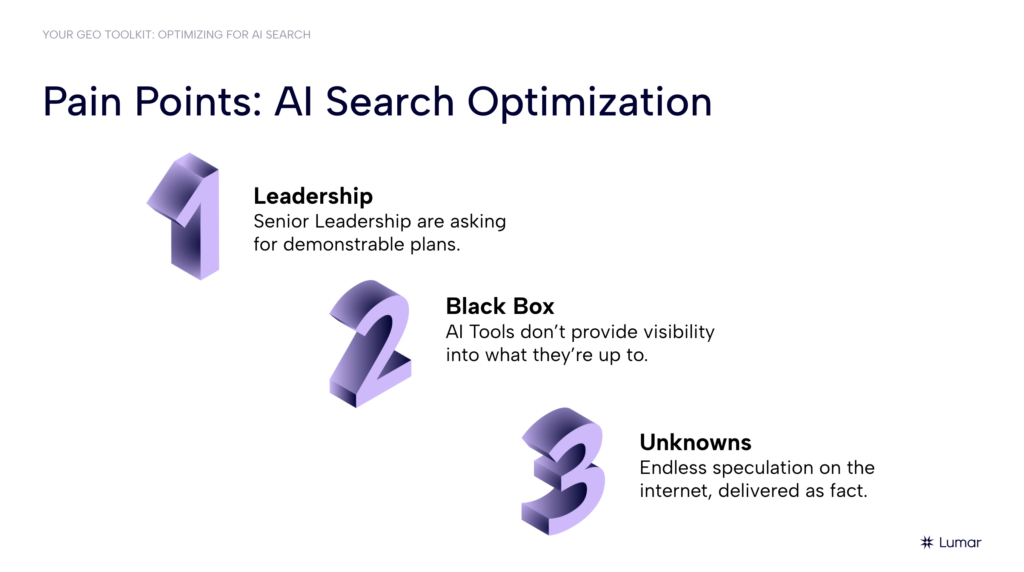
Matt Ford points to 3 key pain points around optimizing for AI search (aka GEO, or generative engine optimization) that he often hears when talking to Lumar users and SEO professionals:
- New Demand from Leadership: Senior leadership teams are asking for demonstrable AI search and visibility plans.
- The AI Black Box: AI tools don’t provide visibility into what they’re up to.
- GEO Speculation & Unknowns: Endless speculation about GEO on the internet, delivered as fact.
A new approach: GEO reporting frameworks in Lumar
When it comes to the new GEO features in the Lumar platform, we aim to provide users with tools and reports that help you:
- Ensure content is discoverable and readable by modern AI systems.
- Ensure content is optimized for AI ‘understanding’.
- Ensure content is optimized for inclusion in AI results.
- Demonstrate to leadership that an AI governance plan is in place.
To address these challenges, Lumar is introducing a new GEO reporting section within its website optimization platform.
The new Lumar GEO toolkit offers AI optimization reports aligned to a 3-part funnel designed to provide a high-level, understandable view of your website’s preparedness for AI search visibility for you to share with senior leadership.
Matt Ford explained that the goal of these GEO reporting tools is to help digital and SEO teams prove they have "actionable items [for GEO] and that you've made progress towards your goals.”
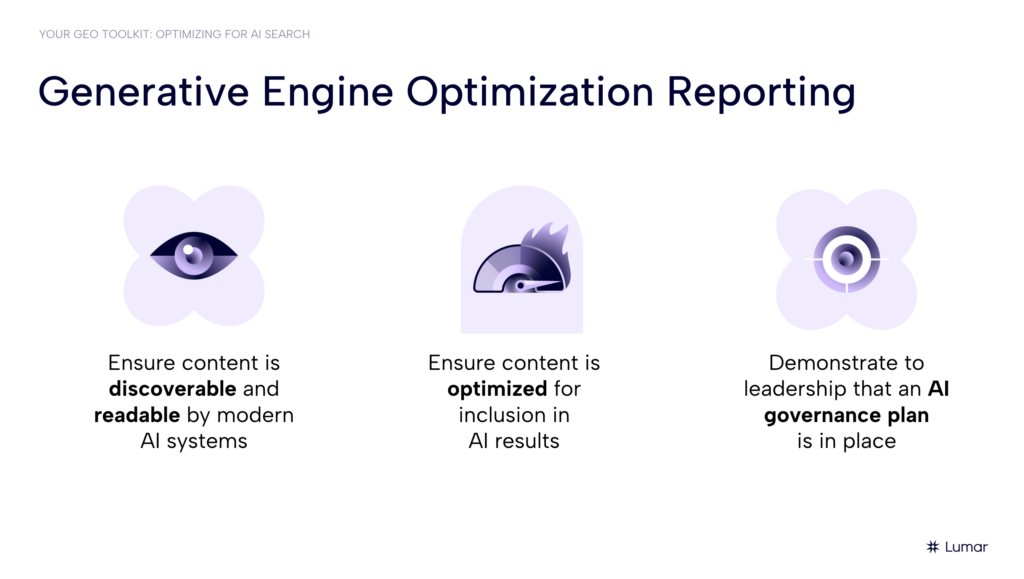
The 3-stage GEO funnel for AI visibility
1. AI Discovery:
The first pillar focuses on AI discoverability. Just like with traditional SEO, if AI bots can't find your content, it doesn't matter how good it is. AI discoverability is about "making sure the bots can find you and they can crawl you and they can understand, they can read your content." says Ford.
2. AI Understanding:
The second pillar is about making sure your content is easily interpreted by bots. "A bot reading a page is different to a human reading a page," explains Ford.
Lumar will report on content structure issues like missing H1s, titles, and problems with data tables, which can hinder a bot's ability to understand a page's meaning.
3. AI Inclusion:
The final pillar, optimizing for AI inclusion, helps users see if their pages are actually being reviewed by AI bots and cited in AI results — in addition to providing EEAT insights that help you optimize your content to be more authoritative and trustworthy in the view of bots.
Lumar will use AI referral sources from analytics to provide concrete data on which pages on your site are getting referrals from AI platforms.
Semantic relevance and AI inclusion:
The Lumar team is also working on a semantic relevance beta program to help users understand "how semantically relevant [pages] are to the [query/topic] that you're trying to appear for,” which may help with AI inclusion.
“Search has changed from what it used to be,” says Ford. “It’s no longer about keyword density. It’s about understanding the meaning and the concepts of a page and making sure that it is aligned with the search intent of the query or prompt.”
“What we're doing [in our semantic relevance beta] is we're using embeddings to compare the content on the page to the queries that you're trying to rank for and understand how semantically relevant they are they to that thing that you're trying to appear for, as well as providing suggestions on how you can improve that relevance,” explains Ford.
New Lumar GEO platform features
Lumar's new GEO tools for AI search visibility optimization are logically organized, aligned to the GEO / AI search funnel we discussed above, and built to help you build an AI governance plan that is easy to share with your leadership teams.
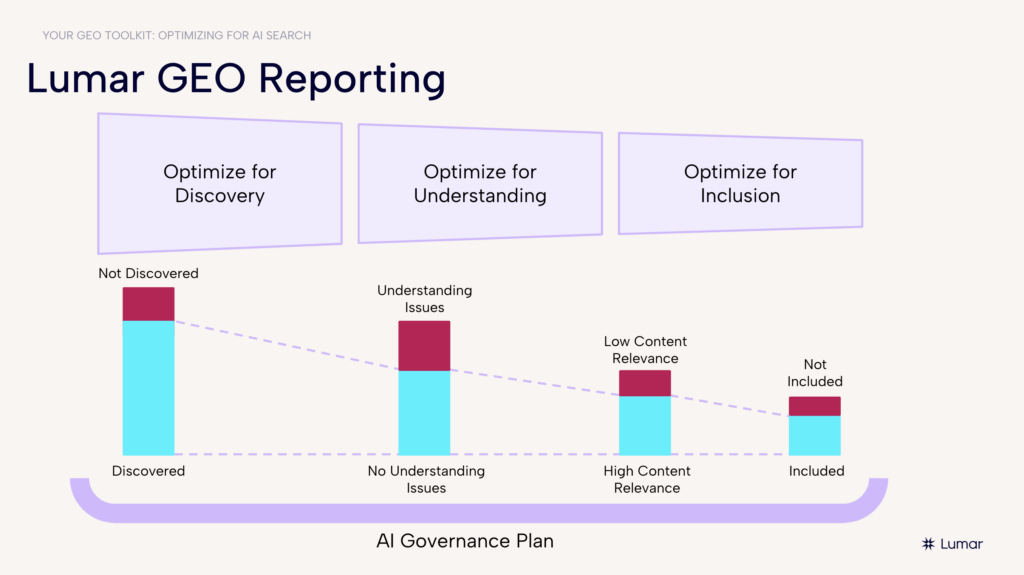
Your new GEO overview dashboard in Lumar
The new GEO dashboard in Lumar will offer a high-level view of your website’s AI search readiness and GEO health. This GEO overview dashboard will provide:
- AI-Readiness / GEO Health Scores: Instantly assess your site’s AI readiness and monitor changes over time.
- Top GEO Errors: Surface the most critical issues affecting your site’s GEO performance, so you know where to focus your optimization efforts.
- GEO Funnel Visualization: Visualize the stages of AI search optimization to identify growth opportunities and clearly report your GEO progress to stakeholders.
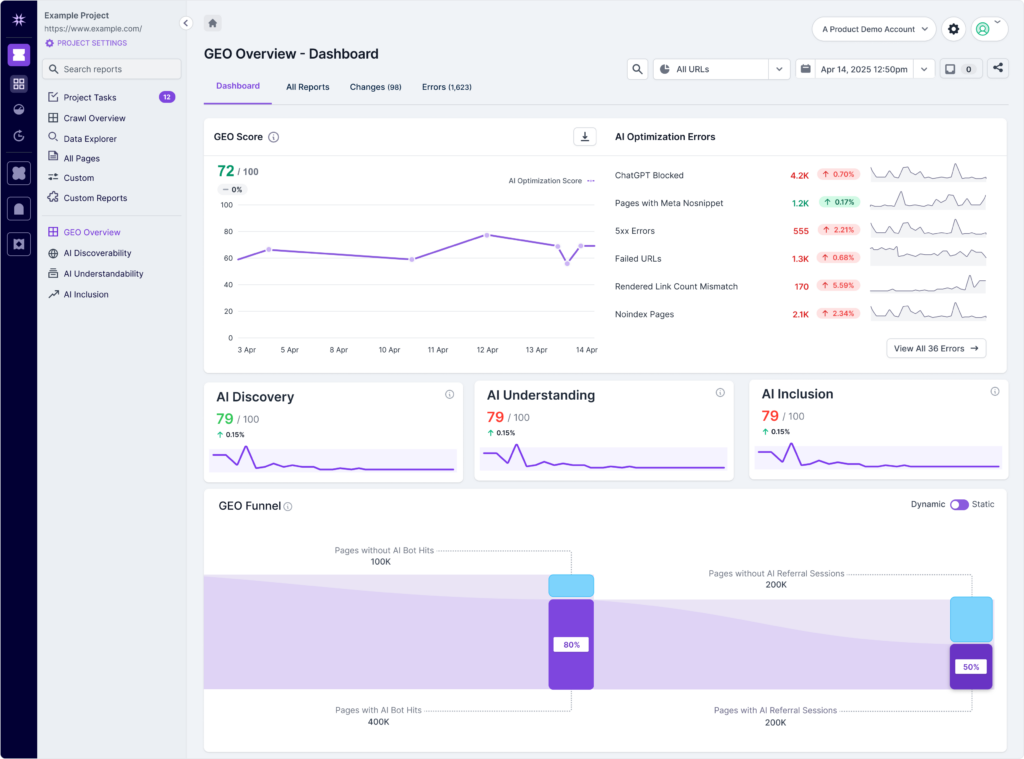
Further GEO dashboards and reports help you dive into your site's health along each stage of the GEO funnel — with dedicated dashboards for AI discovery, AI understanding, and AI inclusion optimization metrics.
AI discovery metrics
For GEO, you'll want to ensure AI systems can effectively discover and access your brand's content — and serve it to users in generative responses. Our AI discoverability reports help identify technical barriers on your website that may prevent AI bots from finding your content.
These reports will help your team identify and address AI discoverability issues, including:
- Availability & crawlability issues
- Mismatches between raw and rendered HTML
- Robots.txt AI-blocking issues
- NoSnippet directives
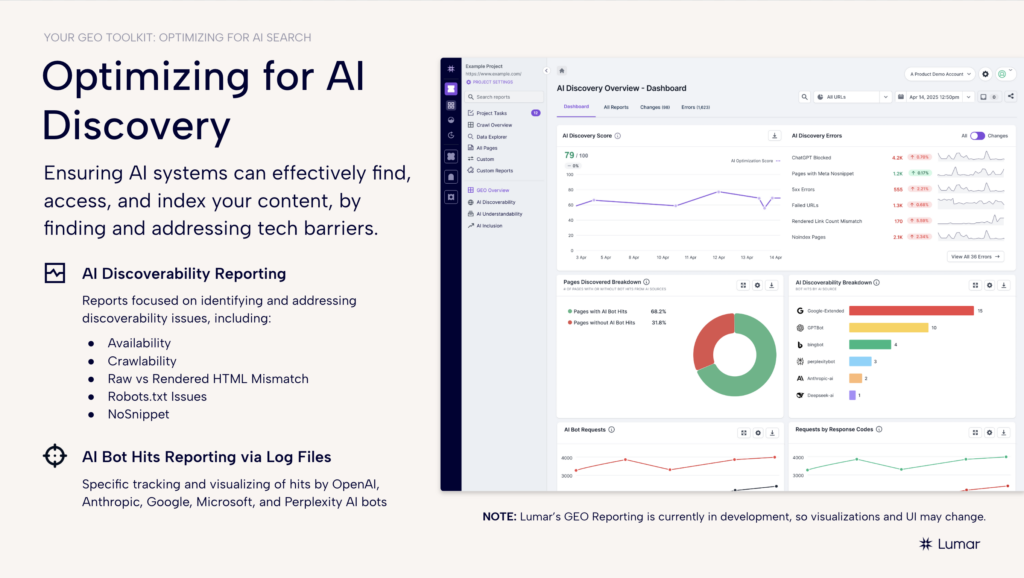
AI understanding metrics
The AI Understanding Dashboard in Lumar focuses on issues impacting AI systems’ ability to ‘understand’ and categorize your website content. Our AI understanding reports in Lumar will highlight issues related to areas like:
- Content quality and clarity
- Structured data usage and implementation
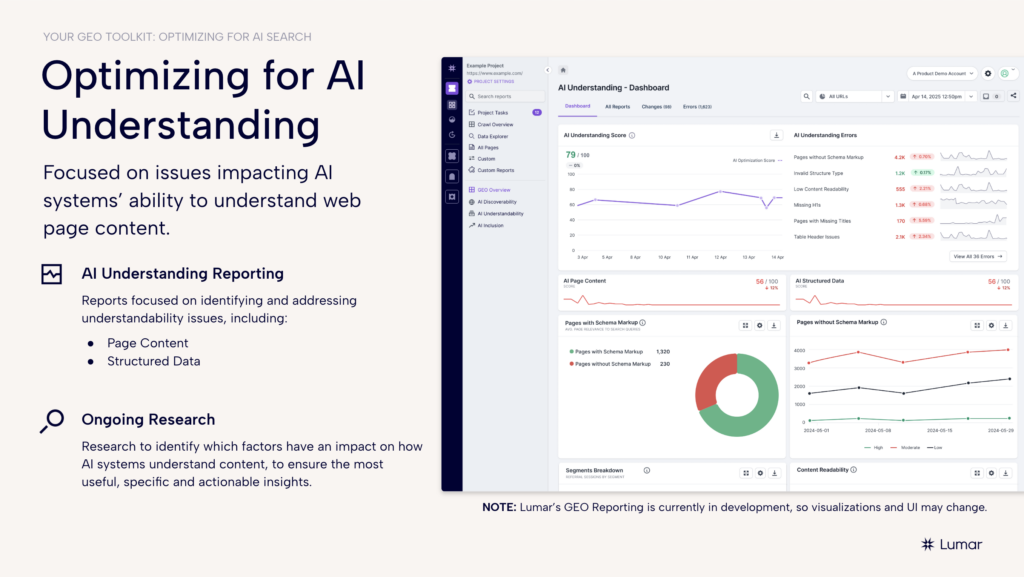
AI inclusion metrics
Lumar’s AI inclusion reports will help ensure your content is recognized as trustworthy and current by AI search systems. This reporting will include:
- Semantic Relevance: Reports to identify content with semantic relevance issues, so they can be optimized to improve performance in both traditional and AI search.
- AI Referral Source Tracking: Specific metrics to track and visualize referral data from prominent AI sources – both at the source level and the landing page level.
- Ongoing Research to enable additional analysis on things like content freshness, authority, and clarity.
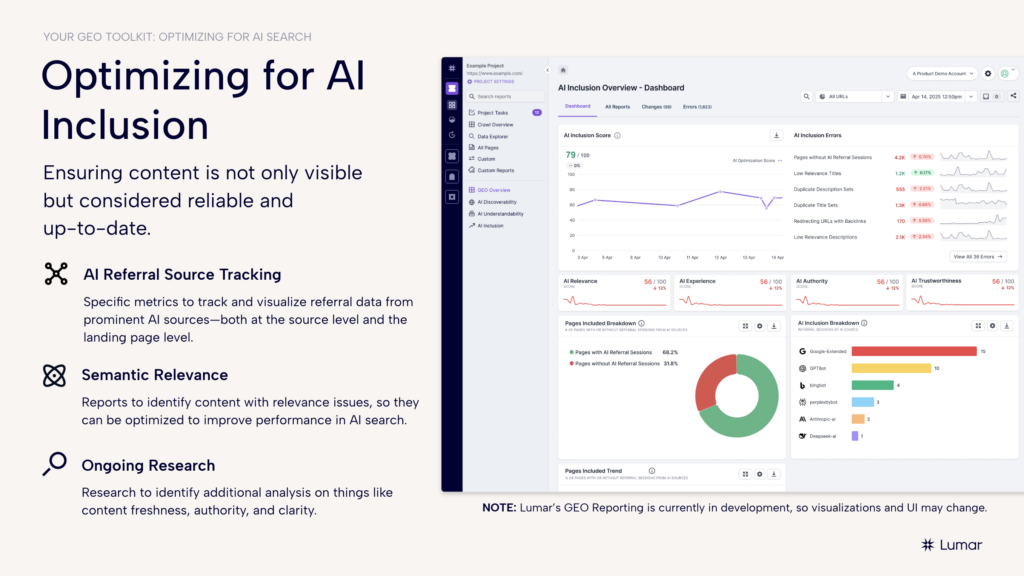
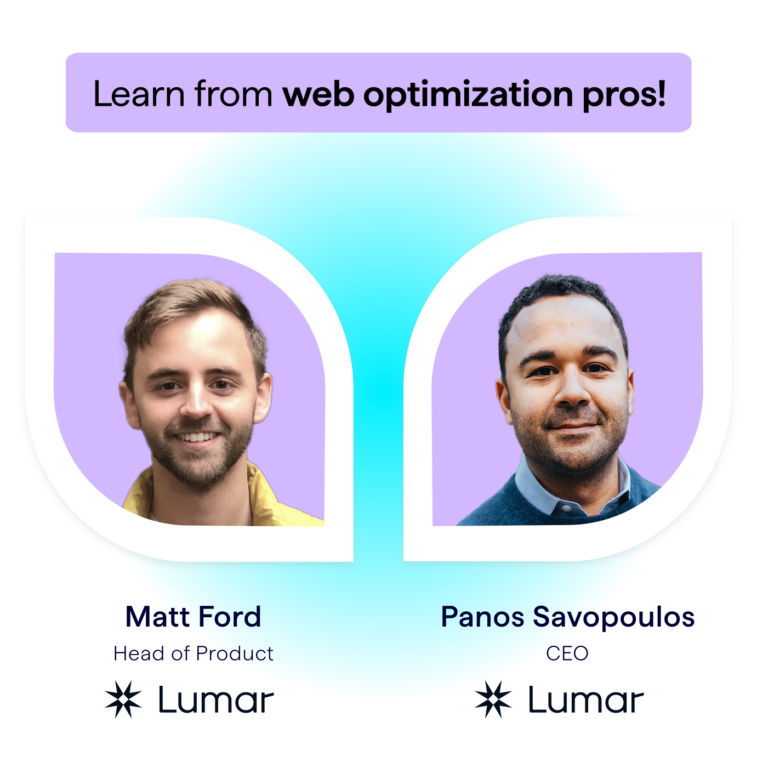
Meet the Webinar Speakers
- Panos Savopoulos, CEO at Lumar
- Matt Ford, Head of Product at Lumar
- (host) Andrew Levey, Head of Product Marketing at Lumar
Don’t miss the next Lumar webinar!
Sign up for our newsletter below to be alerted about upcoming webinars, or give us a follow on LinkedIn to stay up-to-date with all the latest news in SEO, GEO, and digital optimization.
Want even more SEO insights on-demand? Browse Lumar's full library of SEO and website optimization webinars here.
